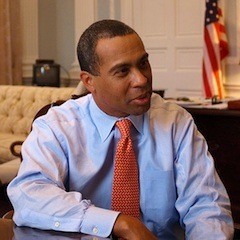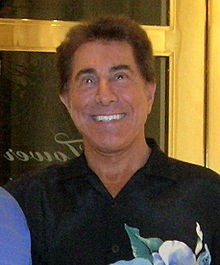Part 6: Behind the Massachusetts Casino Law, a Bevy of Power Players
Tuesday, February 21, 2012

Instead, the argument has simply shifted to which gambling empires should get the nod for the Bay State’s four licenses, and, even more crucially, where should these new gambling/entertainment palaces get built.
Headed by veteran state political hand Steve Crosby, the new Massachusetts Gaming Commission will have the final say in which companies walk away with one of the three casino licenses as well as a license for a smaller slot hall.
The licenses, in turn, are divided up into three regions: a highly competitive Eastern zone that is dominated by Boston and its suburbs which Worcester was wedged into; a Southeastern zone in which the Mashpee Wampanoag Tribe, backed by Malaysian casino giant Genting Group, has a potential monopoly; and a sprawling western zone that stretches from deep into the center of the state to the Berkshires which is proving to be the most competitive so far in terms of potential casino proposals.
But before the state’s new gaming commission can vote on which bidders to go with, would-be casino developers will first have to win the blessing of the town or neighborhood they want to build in, while also cutting deals with officials in neighboring communities.

Meanwhile, some older industrial cities that have expressed interest in having a casino - Worcester, but also New Bedford, for example - find themselves all but boxed out by the state’s new casino law.
Here’s a rundown on all the major players, divided between elected officials and regulators and the casino developers and operators looking to grab a piece of the Massachusetts gambling market.

The Stefaninis: Cousins, both John and Charles Stefanini have done extensive lobbying work for Suffolk Downs. John, now at DLA Piper, was legal counsel to former House Speaker Thomas Finneran. Charles has his own lobbying practice, having gone to bat over the years for big clients like the Massachusetts Nurses Association.
Stan McGee: A former corporate lawyer, McGee has emerged as the Patrick Administration’s legal guru on expanded gambling, especially when it comes to the tricky issue of tribal casino rights. His formal title is assistant secretary for policy and planning in the state Executive Office of Housing and Economic Development.
Doug Rubin: Gov. Patrick’s former chief of staff, Rubin has long been seen as an advocate of expanded gambling since his days on the staff of former State Treasurer Tim Cahill. It was under Rubin’s watch that Patrick first rolled out his ambitious casino plan in the fall of 2007. Rubin now runs his own lobbying firm, with Rhode Island-based lottery vendor GTECH one of his big clients.
Charles Baker: Not that Charles Baker, but the other one. The top Democratic operative got his start in the Dukakis Administration and has lobbied for Suffolk through DLA Piper.
Charles Flaherty: The former House Speaker has spent years opening doors on Beacon Hill for Suffolk.
Robert White: One of Beacon Hill’s top lobbyists, White is putting his skills to work for the Mashpee Wampanoag Tribe.
Steve Tocco: A top advisor to both former Republican governors William Weld and Paul Cellucci, Tocco heads lobbying firm ML Strategies, which is going to bat for Las Vegas tycoon Steve Wynn.
Jan Jones: A former mayor of Las Vegas, Jones, who has a home in Massachusetts, is Caesars chief Gary Loveman’s right-hand woman when it comes to government strategy.
The big political guns
Steve Crosby: Get used to hearing his name. Former state finance chief under Gov. Paul Cellucci and then chief of staff to acting Gov. Jane Swift, Crosby was plucked out of relative obscurity to head the newly formed Massachusetts Gaming Commission. He spent the last several years as a dean of the McCormack Graduate School of Policy and Global Studies at the University of Massachusetts-Boston. As chairman of a five member board, Crosby will play a pivotal role in deciding which casino companies get licenses to build. Originally a mild skeptic of expanded gambling, Crosby’s views have since evolved to embrace the idea of casinos as economic development. So far, he’s taking a go-slow, get-it-right approach, talking openly of trying to avoid the scandals that have beset regulators in Pennsylvania and other states that have rolled out casino gambling.
Tom O’Neill: The son of legendary House Speaker Tip O’Neill, he runs one of the top lobbying firms in Boston. After working with the now defunct Wonderland dog track in Revere for years, O’Neill and his firm are now looking out for the interests of Mohegan Sun, which hopes to snag a license to build a casino in Massachusetts.
George Regan: The former press secretary to late Boston Mayor Kevin White went on to build a public relations empire in his hometown. Regan has dipped in and out of the gambling debate over the years, working with Mohegan Sun before the tribal gambling operator launched its bid for a Massachusetts casino.

Lt. Gov. Tim Murray: Murray’s biggest role in the debate has been as a cheerleader for expanded gambling. Murray has been on record supporting slots at racetracks and later full-fledged casinos since his days as Worcester’s mayor. During his campaign for statewide office in 2006, Murray pledged to Suffolk Downs workers that he would help push for slots at racetracks. However, whether Murray did an adequate job looking out for his hometown’s interests is another question, with Worcester all but out of contention for a potentially lucrative casino project.
House Speaker Robert DeLeo: His district includes Suffolk Downs in Boston, where his father worked as a maitre d’. DeLeo has made no secret of the fact that he wants slots at Suffolk. Moreover, DeLeo initially pushed for a version of expanded gambling that would have included thousands of slot machines not only at Suffolk, but also at other racetracks. Uneasy about getting linked to politically controversial racetrack owners, Patrick pushed back and killed a racetrack slot heavy bill in 2010. DeLeo came back to the bargaining table in 2011 and crafted with Patrick the compromise casino bill that passed last fall. While the centerpiece is three casinos, it also includes plans for one slot parlor, possibly at a racetrack.
Senate President Therese Murray: Unlike DeLeo, the Plymouth Democrat has less of a direct investment in the issue of expanded gambling. The nearest racetrack is just outside of her district in Raynham-Taunton and Murray has had a frosty relationship with its owner, George Carney. But Murray embraced the revenue potential of casino gambling three years ago and has not looked back. She may be best known for one of the most memorable endorsements of casino gambling, mimicking the sound of a slot machine - “Ka-ching!” – in a speech to Boston business leaders in 2009.
Boston Mayor Thomas M. Menino: The long-time Hub mayor has spent decades building a powerful local political machine that makes him all but unassailable, keeping pesky city councilors or other critics firmly on the margins. Regardless of what the city regulations say, Menino has final say over what gets built – and what doesn’t – in Boston. He’s long backed the idea of slot machines at Suffolk Downs and is now all for plans to build a full-fledged casino at the racetrack. He may prove to be one of Suffolk’s biggest assets, able to deliver the crucial local support that Steve Wynn and Robert Kraft are struggling to build for their proposed casino in Foxborough.
Casino operators/developers
Gary Loveman: The chief executive of Caesars Entertainment, Loveman is placing his bets on Suffolk Downs, where he has teamed up with a group of New York and Boston business executives on plans to build a giant, East Boston casino. A former Harvard Business School professor, Loveman has deep local roots and maintains a home in the western suburbs even as runs a Las Vegas-based gambling empire.
Richard Fields and Joe O’Donnell: These two business executives have spent years positioning Suffolk Downs as a potential casino location. With the racetrack threatening to close, Fields, a New York developer and horse racing enthusiast, came to the rescue, buying into the track in 2007 as its new lead investor. Fields, who previously built a casino for Florida’s Seminole Tribe, has quietly but steadily built support in both Boston City Hall and the State House for a major casino at Suffolk. Owner of a nationwide concessions empire, O’Donnell bought a big piece of Suffolk years ago and has long been close to Boston Mayor Thomas M. Menino, whose support is crucial for the project’s success.

Robert Kraft: The New England Patriots owner is also an extremely canny businessman, having built a global paper empire. He’s long wanted to develop a swath of parking lots just across Route 1 from Gillette Stadium, but has struggled to land a corporate headquarters or biotech research complex. Now he’s hoping that Wynn and his casino will turn out to be the big fish he has spent years angling for. But there are more than a few obstacles ahead, from angry Foxborough residents to prohibitions by the National Football League on team owners becoming investors in casino companies or projects.
Mohegan Sun: One of two giant tribal casinos in Connecticut, Mohegan Sun has spent years profiting off Massachusetts gamblers. As much as a third of Mohegan’s business comes from Massachusetts. As the Bay State began seriously debating plans to legalize casinos, Mohegan has taken steps to blunt what could be a devastating blow, lining up land and support for a proposed casino in the town of Palmer. But Mohegan Sun faces two big problems. First, it’s not clear how Mohegan will pay for its new casino, with its Connecticut operation weighed down with hundreds of millions in debt that the tribal gambling operator is now under the gun to refinance. Second, if Mohegan’s intention is to build a feeder facility for its Connecticut casino, this could raise concerns at the Massachusetts Gaming Commission, which has final say over who gets a casino license.
Mashpee Wampanoag Tribe: This Cape Cod tribe gained federal recognition in 2007 and soon after began a hunt for a casino site in Southeastern Massachusetts. After a couple of false starts, the tribe is on the hunt again for land again, Moreover, under the new casino law, the tribe could gain a potential monopoly in the region if it is able to ink a gaming compact with state officials by next summer. Genting Group., the Malaysian casino giant, is the tribe’s latest set of deep-pocketed backers. Genting is building a $1 billion-plus casino in Queens and is pushing into the Florida market as well.
Related Articles
- Casino Series Part 4: Following the Casino Money Trail
- Casino Series Part 5: Where Developers Are Looking For Land
- MA vs RI Casino Wars Heat Up
- Casino Series Part 1: Did Murray Desert Worcester in Casino Bill?
- Casino Series Part 2: Kraft and Vegas - a new NFL?
- Casino Series Part 3: Mass Shortchanged on Casino Fees




Follow us on Pinterest Google + Facebook Twitter See It Read It